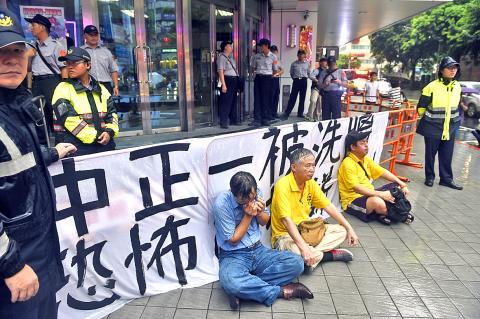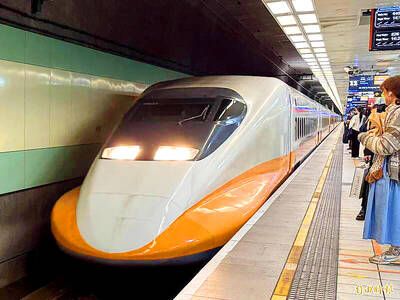The Chinese Nationalist Party (KMT) yesterday condemned political forces “hiding in the background,” while the Democratic Progressive Party (DPP) called on the KMT government to “humbly face the nation’s younger generation,” as both parties expressed regret over the death of a student protester.
Dai Lin (林冠華), who was prominent in Northern Taiwan Anti-Curriculum Changes Alliance protests targeting the Ministry of Education over controversial revisions of high-school curriculum guidlines, was found dead yesterday, apparently taking his own life.
KMT spokesperson Lin Yi-hua (林奕華) said the party feels “regret” over the death and is also “sorry to see that a rational discussion of the curriculum adjustments has not happened because of obfuscation and intervention by certain political forces.”

Photo: George Tsorng, Taipei Times
Lin Yi-hua said the ministry “made positive responses as early as June” to the issue of the curriculum adjustments, including allowing both pre-adjustment and post-adjustment textbooks to be used by schools, promising the differences between the two would not be in standardized college entrance exams, and initiating a procedure to re-examine the curriculum guidelines.
“However, DPP Chairperson Tsai Ing-wen (蔡英文) and [her associates] failed to convey the real circumstances to students,” Lin Yi-hua said. “With their biased accusations that the government has been reluctant to respond and the adjustments were not undertaken in due process, they had children stand on the front lines of social protest, letting them bear enormous pressure and fanning the flames that in the end caused this tragedy.”
Lin Yi-hua called on politicians to be responsible and teach students the value of the rule of law, “instead of hiding behind [the students] and misleading them into engaging in illegal protests.”
The KMT Youth League said that “various kinds of evidence” show that “undoubtedly, certain political parties have played the role of financially aiding and technically supporting the anti-curriculum-adjustments movement, making students the political hatchet men in a public issue that political forces have manipulated.”
“A political party can certainly express its views, but what it should not have done is send high-school students to the front line of the battle for its own political interests,” it said, demanding that “Tsai apologize to Taiwanese and promise that no more political forces would be deployed in schools.”
KMT presidential candidate Hung Hsiu-chu (洪秀柱) said she was “heart-stricken” to hear of Dai Lin’s death and implored “the adults to take their hands off the children.”
She later wrote on Facebook that no discussion would be appropriate given the current mood and called on all sides to exert self-control and stop stirring up emotions among the public.
Separately, Tsai said she is saddened by the news, “especially when young students of this generation have their own ideas about making Taiwan’s future different.”
“They stood up to call on the government to make a change to the unjust procedures by which the decisions on making curriculum guideline changes were made, but the government is unwilling to respond to their call,” she said. “It makes adults sad to see a young person ending his own life.”
Other political parties, including the Taiwan Solidarity Union and the New Power Party, also lamented Dai Lin’s death.
“It is regrettable news that a young life has ended this year, and while we are not certain about the cause leading to the tragedy, we feel the tremendous pressure that Lin faced,” the New Power Party said in a statement, adding that “what should disappear is the new curriculum guidelines, not a young life.”
“It is the cold-blooded government that should reflect on its own faults, not the zealous students,” the statement said.

A 72-year-old man in Kaohsiung was sentenced to 40 days in jail after he was found having sex with a 67-year-old woman under a slide in a public park on Sunday afternoon. At 3pm on Sunday, a mother surnamed Liang (梁) was with her child at a neighborhood park when they found the man, surnamed Tsai (蔡), and woman, surnamed Huang (黃), underneath the slide. Liang took her child away from the scene, took photographs of the two and called the police, who arrived and arrested the couple. During questioning, Tsai told police that he had met Huang that day and offered to

LOOKING NORTH: The base would enhance the military’s awareness of activities in the Bashi Channel, which China Coast Guard ships have been frequenting, an expert said The Philippine Navy on Thursday last week inaugurated a forward operating base in the country’s northern most province of Batanes, which at 185km from Taiwan would be strategically important in a military conflict in the Taiwan Strait. The Philippine Daily Inquirer quoted Northern Luzon Command Commander Lieutenant General Fernyl Buca as saying that the base in Mahatao would bolster the country’s northern defenses and response capabilities. The base is also a response to the “irregular presence this month of armed” of China Coast Guard vessels frequenting the Bashi Channel in the Luzon Strait just south of Taiwan, the paper reported, citing a

A total lunar eclipse, an astronomical event often referred to as a “blood moon,” would be visible to sky watchers in Taiwan starting just before midnight on Sunday night, the Taipei Astronomical Museum said. The phenomenon is also called “blood moon” due to the reddish-orange hue it takes on as the Earth passes directly between the sun and the moon, completely blocking direct sunlight from reaching the lunar surface. The only light is refracted by the Earth’s atmosphere, and its red wavelengths are bent toward the moon, illuminating it in a dramatic crimson light. Describing the event as the most important astronomical phenomenon

BETTER SERVICE QUALITY: From Nov. 10, tickets with reserved seats would only be valid for the date, train and route specified on the ticket, THSRC said Starting on Nov. 10, high-speed rail passengers with reserved seats would be required to exchange their tickets to board an earlier train. Passengers with reserved seats on a specific train are currently allowed to board earlier trains on the same day and sit in non-reserved cars, but as this is happening increasingly often, and affecting quality of travel and ticket sales, Taiwan High-Speed Rail Corp (THSRC) announced that it would be canceling the policy on Nov. 10. It is one of several new measures launched by THSRC chairman Shih Che (史哲) to improve the quality of service, it said. The company also said